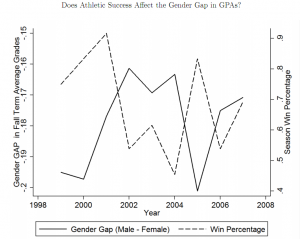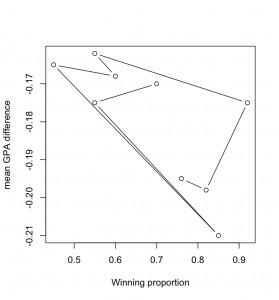Student multitasking
Another seasonal phenomenon at this time of year is the end of US college football. For those who haven’t encountered the game, American football is not entirely unlike rugby, only with less actual kicking and more ad breaks.
Some economists in Oregon have looked at the relationship between the average male:female GPA difference at the University of Oregon and the performance of the Ducks, the University’s football team.
So what did the economists find? While the average GPA for male students was always lower than for female students, there was a definite pattern with a larger gap in years when the Ducks did well and a smaller gap when the team did poorly.

 The original graph is above. I prefer the version on the right, with the two things we are interested in on the two axes. The differences are pretty big, since GPA is on a 4 point scale (but effectively ranges from 2 to 4) and these are differences between all male and all female students
The original graph is above. I prefer the version on the right, with the two things we are interested in on the two axes. The differences are pretty big, since GPA is on a 4 point scale (but effectively ranges from 2 to 4) and these are differences between all male and all female students
— any real impact will affect only some male students and will also affect some female students. A separate survey found that male students were more likely that female students to say that they drink more and study less during football season.
This is just a correlation, in observational data, but it is a moderately convincing one — it’s hard to think of a reason why causation should be in the opposite direction, or to even come up with a confounding variable that would explain the variation in both GPA difference and football performance, and that would vary year-to-year so rapidly.
The strong association that they found might seem implausible, if you don’t know that the Ducks get larger crowds at their matches than the Tri-Nations Cup typically manages. And that the population of Eugene and the surrounding county is rather less than that of Christchurch. College football is serious business purely amateur sport that we must never suggest has anything to do with business.
Thomas Lumley (@tslumley) is Professor of Biostatistics at the University of Auckland. His research interests include semiparametric models, survey sampling, statistical computing, foundations of statistics, and whatever methodological problems his medical collaborators come up with. He also blogs at Biased and Inefficient See all posts by Thomas Lumley »